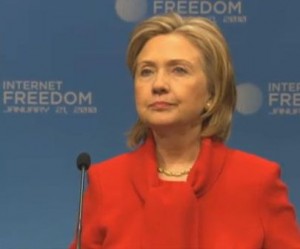by Larry Magid

I have mostly positive feelings about Secretary of State Hillary Clinton’s speech on Internet freedoms that she delivered Thursday at the Newseum in Washington DC.
Although the speech was reportedly in the works for weeks, she addressed the alleged attacks on Google’s servers in China designed to spy on Chinese dissidents. She also alluded to Google’s announcement that it would no longer censor results of searches in China by suggesting that American businesses should resist censorship: “Censorship should not be in any way accepted by any company from anywhere. And in America, American companies need to make a principled stand. This needs to be part of our national brand. I’m confident that consumers worldwide will reward companies that follow those principles.”
Committing U.S. Resources
She also committed U.S. resources to the cause of Internet freedom. “Today I’m announcing that over the next year, we will work with partners in industry, academia, and nongovernmental organizations to establish a standing effort that will harness the power of connection technologies and apply them to our diplomatic goals.”
And she sort of announced a product, or at least an idea for one. “Let’s say I want to create a mobile phone application that would allow people to rate government ministries, including ours, on their responsiveness and efficiency and also to ferret out and report corruption. The hardware required to make this idea work (mobile phones) is already in the hands of billions of potential users. And the software involved would be relatively inexpensive to develop and deploy.
Note to Sec. Clinton: Even bad guys deserve free speech
While most of her comments encouraged freedom of speech, she did hedge her bet in one respect. She said “we do not tolerate those who incite others to violence, such as the agents of al-Qaida who are, at this moment, using the internet to promote the mass murder of innocent people across the world And hate speech that targets individuals on the basis of their race, religion, ethnicity, gender, or sexual orientation is reprehensible.” While I agree with her on both counts, it’s important that our government and our allies realize that the suppression of any form of speech — even speech we despise — is a step down a slippery slope towards censorship. That doesn’t mean we shouldn’t condemn speech that promotes terrorism and hate but it does mean that we need to be extremely thoughtful about any attempts to supress it with anytng other than more speech to counter lies, hate and extremist proportional.
Lessons for American families and schools
Anne Collier of NetFamilyNews (who is my co-director at ConnectSafely.org analyzed the speech from her perspective as an advocate of young people’s use of technology, saying that she “couldn’t help but think about how much we need to respect, teach, and model good citizenship at home and school (here and in every country) – using the media kids use and love – in order to realize Secretary Clinton’s vision for Internet freedom.” In response to Sec. Clinton’s suggestion that we need to “create norms of behavior among states and encourage respect for the global networked commons,” Collier added that ” we need to start here at home, promoting and modeling norms of good behavior online and in homes and classrooms using the social (behavioral) media and technologies where so much kid behavior occurs now.”
A bold line in the ‘cyber-sand’
Adam Theirer, president of the Progress & Freedom Foundation blogged at Technology Liberation Front that Clinton’s remarks “will go down as a historic speech in the field of Internet policy since she drew a bold line in the cyber-sand regarding exactly where the United States stands on global online freedom.”
He reminded his readers that “less than 15 years ago in this country we had a heated debate over whether American citizens should even be allowed to use encryption technology, or if the government should “hold the keys” to such technologies.” That was during Mrs. Clinton’s husbands’ administration. At the risk of name dropping I was on Air Force 2 with Al Gore when the vice president admitted — perhaps for the first time — that the administration was thinking of abandoning its policy of supporting what now seems like an archaic policy.
Watch speech, listen to 8 minutes of excerpts or read the transcript
If you have an hour to watch Sec. Clinton’s speech you can do so here. If you have 8 minutes to spare, you can listen to my podcast with excerpts and brief comments. Here is a complete transcript.

Be the first to comment